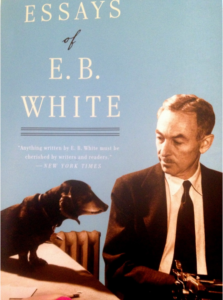
Essays of E.B. White
384 pages
Published 1977 by Harper Perennial/Modern Classics
It was the third book in a small stack of old books that sat on the corner of my writing desk. I have three writing surfaces: This desk here at the beach house. A small, round table under a gazebo overlooking the Pacific Ocean in our home in Nicaragua. And a bar top at my Cigar Club in Delray Beach.
Each has a similar stack of books on it – books pulled from the shelves in the past several weeks, spurred by something I’d read or heard, waiting till I had time to read them.
This book, Essays of E.B. White, seemed the perfect elixir for the stress I was feeling. I knew White as the co-author of the classic Elements of Style, which I’ve read at least a dozen times, and I knew he wrote essays for The New Yorker, back in its glory days. I had no idea he was also the author of Charlotte’s Webb and Stuart Little.
Since my time was limited, I read only a half-dozen of the essays, but they were all Malted-Milk-Balls fun to read.
I think my favorite essay (so far) is “Death of a Pig,” White’s account of his efforts to save a sick pig that he’d bought and raised to be butchered. Here’s an excerpt:
“The scheme of buying a spring pig in blossomtime, feeding it through the summer and fall, and butchering it when the solid cold weather arrives, is a familiar scheme to me and follows an antique pattern. It is a tragedy enacted on most farms with perfect fidelity to the original script. The murder, being premeditated, is in the first degree but is quick and skillful, and smoked bacon and ham provide a ceremonial ending whose fitness is seldom questioned.”
And here’s an excerpt from “The World of Tomorrow,” on the 1939 New York World’s Fair:
“The truth is my ethmoid sinuses broke down on the eve of Fair Day, and this meant I had to visit the Fair carrying a box of Kleenex concealed in a copy of the Herald Tribune. When you can’t breathe through your nose, Tomorrow seems strangely like the day before yesterday.”
And here’s one from “Some Remarks on Humor” (written as part of a preface to A Subtreasury of American Humor):
“Analysts have had their go at humor, and I have read some of this interpretive literature, but without being greatly instructed. Humor can be dissected, as a frog can, but the thing dies in the process and the innards are discouraging to any but the pure scientific mind.”
Interesting Fact: Before his death in 1985, E.B. White suffered from Alzheimer’s disease, and his son, Joel, would read his books back to him. Since he couldn’t remember writing some of them, he would sometimes criticize the writing, saying it wasn’t good enough. If he liked what he heard, he’d ask Joel who wrote the book. Upon hearing that he was the author, he’d reply with, “Well, not bad.”
From The Washington Post: “Some of the finest examples of contemporary, genuinely American prose. White’s style incorporates eloquence without affection, profundity without pomposity, and wit without frivolity or hostility. Like his predecessors Thoreau and Twain, White’s creative, humane, and graceful perceptions are an education for the sensibilities.”
From San Francisco Examiner: “The abiding spirit of these essays is humane, compassionate, traditionalistic. No matter what his subject, White always keeps his eye on the long view and the larger perspective. There are times when I feel his work is as much a national resource as the Liberty Bell, a call to the best and noblest in us.”
 MarkFord
MarkFord